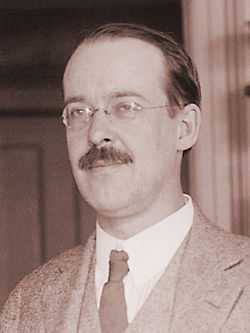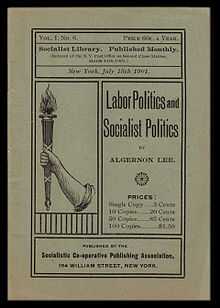Algernon Lee

Algernon H. Lee (1873–1954) was an American socialist politician and educator, best known as the Director of Education at the Rand School of Social Science for 35 years.
Biography
Early years
Algernon Lee was born September 15, 1873 in Dubuque, Iowa, the son of a millwright and carpenter.[1]
He attended the University of Minnesota from 1892 through 1897.[1] While attending school in Minneapolis-St. Paul, Lee joined the Socialist Labor Party of America (SLP), first enrolling in the party's ranks in 1895.[1]
Political career

Lee became the Minnesota State Secretary of the Socialist Labor Party in 1898 and he edited a socialist newspaper in Minneapolis called The Tocsin.[1] He was not long in that role, however, as he chose to leave the party during the bitter party split of 1899, joining the so-called Springfield faction of the Social Democratic Party of America. Lee moved to New York City in 1899 to work as a paid editor of The Worker, continuing in that position with its successor, The New York Call, established in 1908.[1]
Lee was a founding member of the Socialist Party of America (SPA), established in the summer of 1901 when the two organizations calling themselves the "Social Democratic Party" joined forces at a Unity Convention held in Indianapolis, Indiana.
Lee left The Call in 1909 to join the staff of the Rand School of Social Science, an educational institute closely linked to the SPA, as its Educational Director. Lee remained in this position for the rest of his life.[2]
During the first two decades of the 20th Century, Algernon Lee was recognized as one of the Socialist Party's leading members. He was a frequent delegate to socialist gatherings, both national and international. In addition to attending nearly every National Convention of the SPA, Lee was elected a delegate of the party to the 1904 Amsterdam Congress, the 1907 Stuttgart Congress, the 1916 Hague Congress of the Second International.[1] Lee was also selected to join Victor L. Berger and Morris Hillquit as delegates of the SPA to a May 1917 general conference of Socialists held in Stockholm on the question of world peace, but was blocked from attending the gathering when the trio were refused passports to travel by Secretary of State Robert Lansing, who characterized the gathering as "a cleverly directed German war move."[3]
Lee was also a delegate of the SPA to the 1922 Frankfurt Congress of the Labour and Socialist International.[1]
Lee was a frequent candidate for political office on the ticket of the Socialist Party. Candidate for Mayor of New York City in 1905. In 1909, he was a candidate for the New York State Assembly from the 6th District. Lee was elected a member of the New York City Board of Aldermen and remained a member of that body from 1918 to 1921.[4] In 1916, Lee was the Socialist candidate for Governor of New York.
He was twice a Socialist candidate for Congress: in the 14th District in 1920, and in 1926 in the 13th District. Lee also ran for U.S. Senator from New York in 1922. He was three times the Socialist Party's nominee for the New York State Senate, running in 1928 and 1930 in the 14th District, and in 1932 in the 17th District. Lee was also a delegate to New York convention to ratify the 21st Amendment, which ended Prohibition, in 1933.
During the internal struggle which swept the Socialist Party during the second half of the 1930s, Lee sided with the so-called "Old Guard faction," headed prominently by Louis Waldman and James Oneal. He was a member of the "Provisional Executive Committee" of the Committee for the Preservation of the Socialist Party in 1934. Lee left the Socialist Party with his "Old Guard" comrades to help form the Social Democratic Federation (SDF) in 1936.[4] Lee remained affiliated with the SDF for the duration of his life.
From 1939 through 1948, Lee wrote and delivered a weekly radio broadcast on national and international affairs for the SDF's radio station, WEVD.[4]
Death and legacy
Algernon Lee died in 1954.
Footnotes
- ↑ 1.0 1.1 1.2 1.3 1.4 1.5 1.6 Solon DeLeon with Irma C. Hayssen and Grace Poole (eds.), The American Labor Who's Who. New York: Hanford Press, 1925; pg. 133.
- ↑ "Guide to the Algernon Lee Papers," Tamiment Library, New York University, Collection TAM 014.
- ↑ Morris Hillquit, Loose Leaves from a Busy Life. New York: Macmillan, 1934; pp. 155-156.
- ↑ 4.0 4.1 4.2 Guide to the Algernon Lee Papers TAM 014, Tamiment Library, New York University. Retrieved October 25, 2009.
Works
- Lectures on the Development of Society. Minneapolis, MN: Socialist Educational Club, 1898.
- Labor Politics and Socialist Politics. New York: Socialistic Co-operative Publishing Association, July 1901.
- "Socialism in America" in American Almanac and Year Book, 1903. New York: New York American and Journal, Hearst's Chicago American, and San Francisco Examiner, 1903.
- A Study Course in Socialism. New York: Rand School of Social Science, Correspondence Dept., n.d. [c. 1913].
- "Tidings of the Times," Metropolitan Magazine, vol. 37, no. 5 (March 1913), pp. 56–57.
- Social History and Economics: Twenty-two Lessons. New York: Rand School of Social Science, Correspondence Dept., 1915.
- "Story of the Rand School" in Samuel Untermeyer et al., The Case of the Rand School. New York: Rand School of Social Science, 1919.
- The Essentials of Marx, including The Communist Manifesto and Wage-Labor and Capital; Value, Price and Profit and Other Selections. . Editor. New York: Vanguard Press, 1926. Reissued 1927, 1946.
- Issues Between the Parties. With Frederick Morgan Davenport and Lindsay Rogers. Chicago: University of Chicago Press, n.d. [1932].
- Debate: Should the United States Keep Out of Anti-Fascist War? With Harry Elmer Barnes. New York: Rand School of Social Science, 1939.
- On to Social Democracy! : "Rugged Individualism" Out of Date — Dictatorship even Worse than Capitalism — We Must Socialize our Democracy. New York: Social Democratic Federation, n.d. [c. 1940].
Further reading
- James C. Duram, "Algernon Lee's Correspondence with Karl Kautsky: An “Old Guard” Perspective on the Failure of American Socialism." Labor History, vol. 20, no. 3 (Summer 1979), pp. 420-434.
- John L. Recchiuti, "The Rand School of Social Science during the Progressive Era: Will to Power of a Stratum of the American Intellectual Class." Journal of the History of the Behavioral Sciences, vol. 31, no. 2 (February 2006), pp. 149–161.
External links
- "Guide to the Algernon Lee Papers," Tamiment Library, New York University, Collection TAM 014. Retrieved October 22, 2009.
- Algernon Lee, Proposal Ambiguous and Incomplete. A Letter to the Editor of The New York Call, March 29, 1919. Retrieved October 25, 2009.